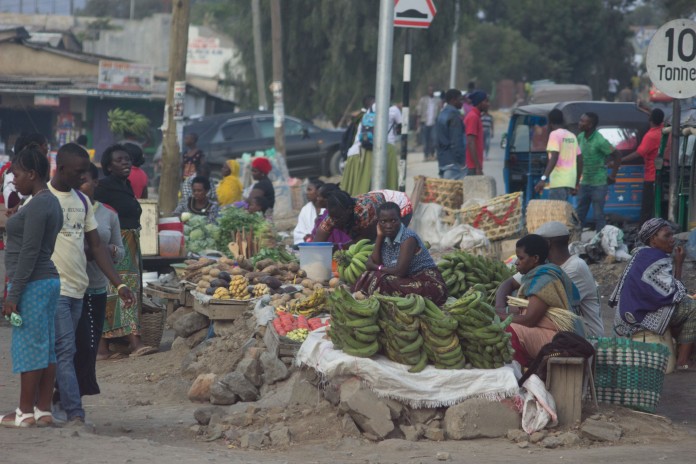
The chopper-drone was already on the roof when I reached the top of the stairs. I hadn’t heard it approach, but I suppose that’s the point of a stealth vehicle. The side hatch swung open for me and I stepped in awkwardly, sitting in the only unoccupied seat between the soldiers. As soon as I was buckled in the door came down again and we were airborne; at least that’s what the display screen up ahead told me. There were no windows in the chopper and no sense of inertia, so for all I knew we were still on the landing pad or plummeting to the ground.
As we left the city airspace the display ahead changed to various images of our destination, an oil-rig approximately 40 miles offshore. The solders around me didn’t seem to react to it; they looked indistinguishable from one another, identical armour studded in identical LEDs with identical helmets, thick metal plating covering the entire head except the mouth and nose. There were no LEDs on the helmets. Some consultant probably made a ridiculous amount of money telling the military that soldiers with inscrutable expressions were scarier. Inside the helmets the soldiers were probably shown a digital recreation of everything in front of them with additional readouts displaying useful info like the structural integrity of buildings and objects, remaining ammunition, enemy strength and equipment intel, etc. I realised then that the display up ahead was probably playing inside their helmets, meaning that the screen was all for my benefit. I didn’t pay it much mind though; I knew everything I needed to already.
The offshore rig was not a rig at all but instead the exterior front of a subterranean detention-slash-R&D facility. If that makes you a bit nervous then I suppose you’re paying attention. What we were heading into was the one thing scarier than a military blacksite: a military blacksite which has ceased communication with the outside. The soldiers around me were part of Phobos Division, tasked with dealing with messy situations the state didn’t really want civilians, or worse, corporate entities learning about. My presence on the mission was not in keeping with Phobos protocol, but they lacked anyone with my expertise and a rapid response was necessary.
The display suddenly announced that we were only a few minutes from landing and some of the soldiers around me started to flex as much as their armour and fastenings would permit. Suddenly the light in the chopper went out, seconds before the hatch opened once again, flooding the chopper with twilight and salty air. The soldiers were already up and moving, with one behind me putting a hand on my shoulder and pushing me forward, keeping me safely within the formation. The landing pad, indeed the entire upper deck was deserted save for us, and after a brief perimeter sweep we moved forward to the entryway. This would be my first task for the day.
The soldier up front made a token attempt at typing in the access code and was faced with predictable rejection, but I was already stepping up beside him. I extended my hand to the blue holographic pin pad and waited to see it. Sure enough, a grainy orange projection of code appeared behind the pad, and I idly considered that this was the second display today that only I was seeing. The code was bulky, tangled but brutally comprehensive, and for a moment I worried if just maybe I’d been a bit overconfident in accepting this job. But then something shifted. Something was behind that knotted ball of overwhelming text, something conscious, apprehensive. If I could just… just… ah. There. There it is; a solitary unit of green, utterly and obviously sentient. I pushed at it and the knot loosened. The green one darted back into nothingness, and the orange code faded away.
“Again,” I said, and the soldier input the access code once more. This time the pad turned green and the steel door before us slid open with a pneumatic “schuk”. We moved inside. The lights were still on, but no one was home by the looks of things. A reception desk stood unoccupied, next to it was the contraband-detector one had to pass through in order to proceed through he false facility and into the elevator downwards into the true installation. The soldier up front silently indicated the detector then held his hand up: there, but not yet. Then he pointed at the terminal on the reception desk: here first.
I stepped around the desk, for the first time since boarding the chopper not surrounded by the soldiers, and looked at the screen. The signing-in software of the fake drilling corporation was still up, which was unexpected. According to the reports I’d been sent, in the event of a lockdown the base security algorithms were supposed to jettison superfluous programs in order to concentrate on what was undoubtedly a more important situation developing below. The dummy corporation’s software was supposed to be among them. I disregarded this oddity and concentrated on the system before me. I let my mind relax and waited to see through the veil. Ten seconds passed and I was worrying again, trying not to think about the soldiers staring at me blindly. After a while the orange started to bleed in, but slower now, like molasses. In time it burned as brightly as it always did for me, and I started to peer across it for the links to the detector next to me, looking for it’s secret fatal function.
See, the base hadn’t purged. Upon deciding that the situation below was beyond hope, that stability would never be restored and that that which was concealed beneath was now sure to eventually breach containment and reach the surface, the security systems were programmed to utterly ignite the contained atmosphere within. Then flood it, drain it, then ignite it again. Only after this total destruction of any and all things contained within would the facility broadcast the All-Clear and end the lockdown. This facility had been in lockdown for six days now, and no broadcast reassuring those listening that the situation had been resolved, one way or another, had been received. It demanded investigation, but this particular blacksite was a special case. Outfitted with a unique cybersecurity suite which could only be directly accessed via terminals inside the base, the operation had demanded the services of someone like me.
Not to go into too much depth, but my skull contains a fortune in wetware and access programs. By just looking at a computer I’m breaking the law in every country and on most colonies. But I’m a bit of a special case, and maybe I’m owed quite a few favours, so maybe I get a pass on a fair few instances of unauthorised access and maybe I’m permitted to earn a modest income utilising these expensive tools I never asked for. Maybe. It’s hard to describe what I’m seeing when I access a system, but colours stand out pretty well; I just feel around with my eyes and I know what’s doing what and how to manipulate certain functions.
This facility had a hidden arsenal of traps to pick off any who attempted to take a look around during a lockdown. Or any who were surface-side when the doors slammed shut. It was very noteworthy that we had yet to encounter a single body or sign of havoc, as if everyone had been below when the lockdown occurred, even those without clearance. Right now I was trying to access the contraband-detector and disable it’s hidden function, which our reports had informed us was a fatal electrical field which activated upon passing through. But when I found the quiet little string of code trailing off to the detector, it showed no signs of activation. As far as I could see, the field was off. I relayed this to the soldiers and they looked back at me impassively. One of them took a magazine off his hip and slid it through the detector; the alarm flared loudly, making me jump, but nothing else, no electric. The screen in front of me flickered to show a non-permitted item had passed through, and the orange code tried to melt out of view.
That confirmed my suspicions about the bizarrely elusive orange code; it was trying to evade me. Which meant it knew what I was doing. It must have become aware of me at the door pad and had been trying to complicate itself to outsmart me. This had a number of implications, all unsettling: first, there was an AI in the network. There was a strict ban on the development of artificial intelligences within security suites; too much hazard, too much potential for sudden, inexplicable bloodshed. After the Guangdong Tragedy fourteen years ago several international and intercorporate treaties had been put in place, with punishments so severe that even the skankiest outfit wouldn’t dream of wading through that sludge, even this one.
Secondly, the AI was able to perceive me in turn. I couldn’t even explain this one: the way in which I access systems is by no means boilerplate. It’s a very specific platform, likely one of a kind, calibrated specifically for me to best be able to perceive and utilise it. When I access a system I’m basically putting it through a filter so that it appears in a way my systems find legible; for this AI to be able to react to what I’m doing to it, it must be able to detect the way in which it is being perceived, which seems impossible. While it’s trying to hide from me, in it’s own way it’s addressing me.
Communicating.
This shouldn’t have been happening. Whatever this place was working on or hiding below couldn’t have been so important as to justify the creation of such an impossibly sophisticated AI for security use; this kind of thing could bring down a nation if it ever went public. Which led to another suggestion, a clue as to exactly what kind of research they had been performing downstairs, the fruits of which appeared to have escaped containment, only to find itself landlocked on a fake oil rig with no networks to piggy-back onto back to… land.
The chopper.
I burst back out into the evening air, the shouts of the until-now silent soldiers echoing after me, in time to see the chopper-drone ascend and turn back to the mainland. Snapping to work, the world suddenly darkened around me, traces of millions of lines of code beginning to glow orange on the surface of every circuited object around me. In seconds I noticed that the radar dome to my right was in fact a disguised anti-aircraft weapon, one designed to shoot down investigators (or runaways) prior to the All-Clear being given. The chopper was designed to go undetected to such systems, but with the use of my suite I was able to manually grasp the controls and…
I was knocked back by the explosion, the flaming husk of the chopper cascading from the sky. The force of the blast shook me out of my suite and into the harsh light, but not before I saw the green malevolence dart back to the rig and latch onto one of the many bristling arms of networked software on board. It was back with us, and we were stuck here with it.


